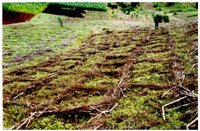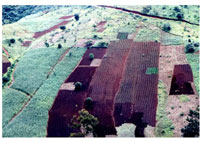| Period: 5 December 2002 - 31 March 2003. Country: Tanzania |
| (1) Dynamics of Land Use Systems and Environmental Management of the Mountain Ecology: The Case of Matengo Highlands, Tanzania |
| NINDI, Stephen Justice (Division of African Area Studies) |
| Key Words: Traditional Farming
Systems, Ngolo, Coffee, Landholding, Ntambo |

Laying ngolo grids (kubonga) |

Ngolo fields in Matengo slopes |
(2) Purpose of the dissertation: The broad objective is to investigate the dynamics of land use systems and environmental management practices in the Matengo highlands in diachronic perspective. Specifically the objectives are examining the kind of land use changes that have occurred with time and the factors behind these changes; determine socio-economic and physical implications of these changes and examine environmental management practices of the Matengo.
(3) - I have been conducting fieldwork in the area since 2001 on land use systems and environmental management practices. The Matengo highlands lie in southwestern part of Tanzania. The elevation goes to about 2000 m asl. The highlands are famous for their labour intensive indigenous farming system locally known as ngolo (Matengo pits) for cultivating food crops such as maize and beans on rotational basis. Coffee is their cash crop and is made on bench terrace or flat seedbed. Their indigenous land holding, a unit of land tenure and environmental management is known as ntambo, a mountain spur circumscribed between two river valleys. The COE field trip from December 2002 to March 2003 enabled me collecting data on land use types, changes in land use, factors behind land use change, vegetation sampling, determination of soil types of the ntambo, household characteristics, population syntheses, farm labor organizations, production trends of major crops (maize, coffee, beans) and off-farm activities among them.
- Preliminary results show that land use change in the Matengo highlands is due to the interplay of factors. The Matengo having been driven off from surrounding plains by the Ngoni tribesmen took refuge in the rugged mountain areas in 19th Century. To sustain their livelihood and maintain soils in steep sloped they invented a labour intensive cultivation system locally known as ngolo or Matengo pits. Later coffee was introduced in the area, which together with population pressure brought significant changes in the ntambo land holding. Population pressure, declining soil fertility in the mountains and decimal performance of coffee made out migration apparent. However, the Matengo maintain their cultural ntambo landholding concept even in the new area. Their intensive cultivation system (ngolo) has also been maintained even in sparsely populated area where they migrate in. Weather instability in recent years has resulted into intensive cultivation of the valley bottoms for "survival". Structural Adjustments Programs coupled with privatization caught the Matengo off guard and desperate as it resulted into collapse of their dependable cooperative union (MBICU), consequently they are now running short of farm inputs, credit and extension services.
|
|